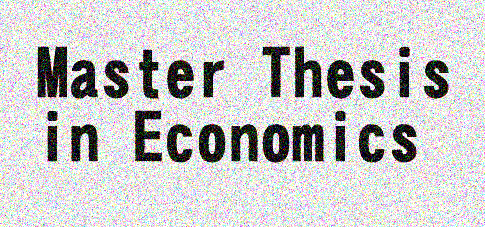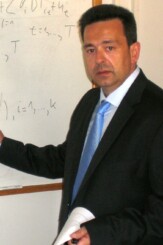Master thesis/Dissertation

Course ID:
Semester: 2nd
Year of Study: 1st Year
Category: Compulsory
For Erasmus Students: Όχι
Learning Outcomes
The Master thesis/Dissertation consists of an independent research activity aiming at synthesizing and orchestrating a way of analysing a problem and applying this way in order to address a formulated research question. The research question and the followed way of analysis is based on contemporary literature. A Master thesis has a research, scientific and applied aspect and is always carried out by the student in close cooperation with his supervisor, who oversees the efforts.
Under the guidance of the supervisor, the student is given the opportunity to gain experience on working in depth on a research issue in the field of economics. The overall aim is to allow students to cultivate their analytical thinking skills by combining theory and application in order to explore systematically a contemporary research question in the field of applied economics.
The learning outcomes are focused on three main areas: knowledge, skills and abilities. After pursuing the master thesis, students will be able to:
- Get an overview of the contemporary research question of a specific area of economics.
- To formalize a research question in a way that be analysed and approached using the scientific method
- To learn defining the limits of a research question and distinguish between primary and secondary research objectives
- To use theoretical knowledge in applied settings in the field of economics
- To get familiar with the contemporary literature of a specific field in economics and assess their importance with respect to the research question under consideration
- To define and follow a research plan and methodology addressing the formulated research question
- To interpret, position and discuss the findings in the context of the related literature
- To author scientific reports to communicate clearly the results of a research effort
- To collect the appropriate data and assessing them with respect to their ability answering a specific research question
- To preprocess and process datasets in an appropriate way so that the data can be analyzed with the devised method and in compliance with the adopted methodology
- To be able to evaluate every step of the followed methodology
- To discuss the results of the analysis in the context of the relevant literature
- To understand the role of computational resources in addressing questions in the field of applied economics.
Course Contents
The master thesis aims at offering the student the opportunity of applying real-world data to statistical models and comparing the results against the theories being tested which he has been taught during the courses.
Although master theses can belong to several categories such as literature review, development oriented or applied, the postgraduate program focuses mainly on dissertations that have a strong applied component.
Pursuing a dissertation requires students to carry out the following actions:
Introducing and motivating the research: where the scientific field is presented, the research objectives are formulated and connected to the research question.
Literature review: where the research question is discussed and related to existing theories and approaches and the degree of coverage of the research question under consideration is assessed. In particular, existing approaches are systematically analysed and assessed and their limitations identified so that the thesis’ contribution emerges clearly.
Description of datasets and methodology: where the datasets used to address the research question are presented, their effectiveness of answering the research question is shown and the methodology is clearly outlined.
Interpretation of results: where the level of analysis of the empirical data is defined and connected to the research questions in contemporary applied economics
Conclusions: where the empirical results are used to formulate a answer to the research questions posed in the context of the economic theory. More specifically the concluding remarks are connected to the empirical results as well as with their implications on other related research questions and future research.
Appendixes: where the tools used to carry out the research are presented as well as any guidance on how to configure and apply these can be described.
Teaching Activities
Teaching Organization
Assessment
Student’s performance evaluation is done by the dissertations advisory committee which consists of three professors or researchers active in the dissertation’s field. Every master thesis is assigned to an advisory committee.
The student, after having finished the dissertation work, writes the master thesis which he sends, upon completion, to the advisory committee. The advisory committee may comment on the thesis or request changing parts of the text. The postgraduate program offers MS Word and Lateχ templates to students to author their thesis using the adopted guidelines. These templates can be found here: http://postgrad.econ.upatras.gr/el/msc/theses and https://eclass.upatras.gr/courses/ECON1453/ .
The student defends his master thesis against the advisory committee on a date that has been agreed upon. The master thesis defence is open to the public and announced on public lists. After the master thesis defence, the advisory committee meets in private to grade the thesis. Each committee member grades the thesis independently. The final thesis grade is calculated as the average of the three grades assigned to the thesis by the advisory committee members.
The program has compiled a list of criteria that are taken into consideration when grading a master thesis. These criteria can be found on the postgraduates program website: http://postgrad.econ.upatras.gr/el/msc/theses and https://eclass.upatras.gr/courses/ECON1453/ .
Use of ICT
- Postgraduate website and the eClass portal where the list of available dissertations are published
- Use of databases and datasets to extract the relevant data and analyse them appropriately to address the research objectives.
- Using University of Patras’ library to get access to published works in the thesis’ specific field
- Use of specialized software to conduct the way of analysis specified (User of specialize hardware to speed up time-consuming tasks)
- Using videoconferencing systems to facilitate meetings between the student and his thesis supervisor.









